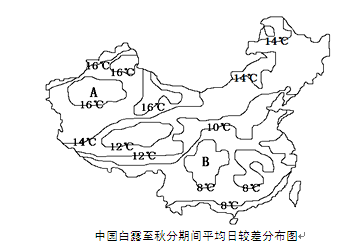问题
选择题
每年9月7日前后为“白露”节气,届时我国多数地区昼夜温差往往为全年最大。夜间空气中的水汽遇冷凝结成细小的水滴,附着在花草树木的绿叶或花瓣上,早晨的阳光照射,看上去洁白晶莹,因而得“白露”美名。

小题1:结合“中国白露至秋分期间平均日较差分布图”,下列描述正确的是
A.B地一定为8℃以上
B.A地与B地最大差值可达8℃
C.温差从东南向西北递减
D.在此期间上海出现“白露”机会一般比同纬度地区少小题2:以下关于日较差的说法正确的是
A.阴天比晴天日较差大
B.沿海比内陆日较差大
C.纬度高的地区比纬度低的地区日较差大
D.日较差大利于瓜果糖分积累小题3:图中A地比B地温差大的主要原因是
A.地势高
B.地处内陆
C.纬度高
D.寒潮侵袭
答案
小题1: D
小题1: D
小题1: B
小题1:根据“大于大的,小于小的”可知B地一定为8℃以下,A地与B地最大差值可达12℃,温差从东南向西北递增。故选D。
小题2:日较差大表明白天温度高,利于植物光合作用;晚上温度低,利于植物有机物的积累,从而利于瓜果糖分积累。故选D。
小题3:图中A地为非季风区,地处内陆,温差大;B地为季风区,温差小。故选B。
